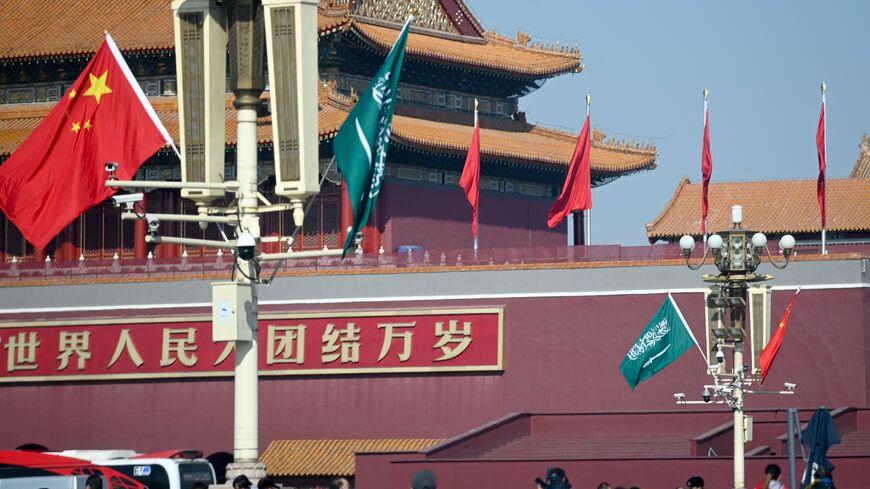Saudi Arabia and China will participate in a business conference in Riyadh this month, expected to draw major businesses and investment firms, as the kingdom continues to pursue stronger economic, energy and political ties with the People's Republic and despite concerns from Washington.
Background: The 10th Arab-China Business Conference will run from June 11-12 in Riyadh. The conference will feature networking events as well as panels and discussions. Topics include China’s Belt and Road infrastructure initiative, renewable energy, pharmaceuticals, startups, esports, tourism and food security, according to the conference’s website.
The speakers will be from several Chinese and Saudi entities, including the Hong Kong Stock Exchange, the Chinese energy firm Envision Group, Saudi Arabia’s INC Robotics and Saudia Aerospace Engineering Industries. Businesspeople from Jordan, the United Arab Emirates and other countries in the region will also participate.
Organizers are expecting more than 2,000 attendees, according to a press release.
“China and the kingdom are truly countries of action, and our cooperation is ongoing,” China’s ambassador in Riyadh, Chen Weiqing, tweeted on Wednesday about the conference.
Why it matters: Saudi Arabia’s ties with China have hit a new high this year. In March, Beijing brokered the Saudi-Iranian agreement that resumed diplomatic relations between the two arch-rivals. That same month, Saudi Arabia became a dialogue partner of the China-led Shanghai Cooperation Organization. More recently, Saudi oil giant Aramco signed a deal with China’s Baosteel in May to build a steel factory in the kingdom.
China is the kingdom’s largest trading partner, while Saudi Arabia has emerged as one of China’s biggest oil suppliers, having been passed by Russia as the top supplier earlier this year.
Mohammed Soliman, a director at the Washington-based Middle East Institute, said that Saudi Arabia’s affinity to China is mostly driven by economics.
“Saudi Arabia aims to diversify economic partnerships, decrease dependency on traditional allies, such as the United States, and sees China as a crucial market for oil exports,” Soliman told Al-Monitor. “Riyadh also seeks greater Chinese investment in non-oil sectors and expertise in infrastructure, technology, and renewable energy.”
Soliman added that “Saudi Arabia values China's geopolitical influence,” pointing to the agreement with Iran, and Beijing transactional approach in foreign policy.
Saudi Arabia’s pivot towards China is further notable due to its historic alignment with the United States.
“While Saudi Arabia's cooperation with China may raise concerns about regional dynamics and US influence, it is crucial for Washington to understand Riyadh's motives behind economic diversification and accessing the Chinese market,” said Soliman. “By engaging in dialogue and collaborating on strategic areas that contribute to Saudi Arabia's geo-strategic and economic transformation, the US can effectively navigate this evolving landscape and find common ground with Riyadh.”
The Arab-China Business Conference involves several Saudi government agencies, and the topics on the agenda unsurprisingly align with the kingdom’s economic diversification interests. The Saudi Public Investment Fund is especially interested in esports, tourism and renewable energy.
Oil is still king in Saudi Arabia, however, and accounts for around 40% of the country’s gross domestic product.
Know more: China’s relations with other Gulf states are also improving. On Tuesday, the UAE Central Bank held a meeting with its Hong Kong counterpart to discuss cooperation on fintech, cryptocurrency and more.
In April, the Chinese oil giant Sinopec acquired a stake in one of QatarEnergy’s oil fields.







